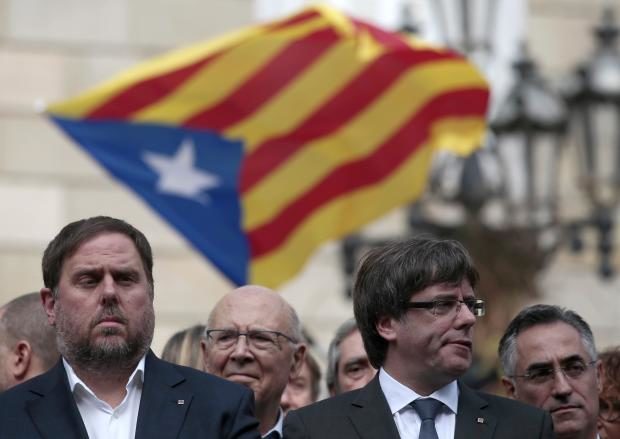Catalonia calls for int’ mediation in Spain amid referendum dispute

Catalan regional Vice President Oriol Junqueras (left) and Catalan President Carles Puigdemont attend a protest called by pro-independence outside of the Palau Generalitat in Barcelona, Spain, Monday, Oct. 2, 2017. Catalonia’s government will hold a closed-door Cabinet meeting Monday to discuss the next steps in its plan to declare independence from Spain following a disputed referendum marred by violence. (Photo by MANU FERNANDEZ / AP)
BARCELONA, Spain — Catalonia’s leader on Monday called for international mediation and for the European Union “to stop looking the other way” in the region’s bid to secede from Spain, a day after a violent crackdown by Spanish police trying to block referendum voting.
Carles Puigdemont also said that he would file a complaint against Spanish police after officers fired rubber bullets, smashed into polling stations Sunday and beat back protesters with batons. Puigdemont didn’t give further details, but urged Spain’s national police reinforcements to leave the northeastern region.
But Spanish authorities commended police, saying they acted professionally and that their response was proportionate. And Spain’s interior minister said that the 5,000 extra officers deployed to Catalonia would stay as long as necessary.
Catalan officials say an overwhelming majority of voters supported independence from Spain, but the central government in Madrid has repeatedly condemned the referendum as illegal, unconstitutional and invalid.
The EU and most governments in the 28-nation bloc haven’t backed Catalonia’s independence movement, fearful that it could unleash a wave of secessionist movements on the continent.
Article continues after this advertisementBut Puigdemont called for the EU to consider Catalonia’s desire to break away from Spain as a regional problem, and urged Spanish Prime Minister Mariano Rajoy’s government to accept mediation.
Article continues after this advertisement“The European Union has to stop looking the other way,” Puigdemont said. “This is not a domestic issue. The need for mediation is evident.”
Earlier Monday, an EU statement implored both sides to pull back from confrontation in favor of dialogue. More than 890 people were injured, most of them not seriously, in confrontations with police trying to shut down the voting. More than 30 police officers were also injured.
The Catalan president said the regional parliament plans to declare independence in the next days. He spoke after a closed-door Cabinet meeting Monday.
The referendum debacle brought Spain and Catalonia closer to a potentially disastrous showdown as each side said Sunday’s events proved them right and neither looked prepared to cede ground.
Rajoy, meanwhile, will meet with Popular Party leaders before seeking a parliamentary session to discuss how to confront the country’s most serious crisis in decades.
He also called an afternoon meeting with the leaders of the opposition Socialist and Ciudadanos (Citizens) parties to discuss Spain’s options.
The impasse developed after Catalan authorities decided to go ahead with Sunday’s referendum even after Spain’s Constitutional Court suspended it. The Spanish central government denies the referendum even took place, while Catalan separatists say it was valid and justifies making a final break with Spain.
Catalonia said preliminary poll results showed 90 percent favored independence after less than half the electorate voted in a day that saw 893 people injured in clashes with riot police. Catalonia’s health services said four people remained in the region’s hospitals, two of them in serious condition. In addition, 33 police officers were injured.
Clashes broke out at a number of voting locations after riot police turned up to prevent people from voting and to confiscate ballot boxes.
Some Catalans said both sides were responsible for the mayhem.
“I am very annoyed for the both sides involved in what happened yesterday,” said Eric Tigra, 56. “I think both sides involved committed grave mistakes. But we must also highlight that if the people of Catalonia go out in the streets and you don’t listen to them then something is not working right.”
Catalan leaders accused Spanish police of brutality and repression while the Spanish government praised security forces for acting firmly.
Videos and photographs of the police actions featured on the front page of news media outlets around the world.
In an editorial, leading Spanish daily El Pais blamed the Catalan government for Sunday’s “shameful” events but also criticized the Spanish government for its inability to tackle the crisis that began about seven years ago. The newspaper said the day was “a defeat for our country.”
So far, the European Union, the US and most international bodies have backed Spain in its stance against Catalan independence.
The EU on Monday urged all sides in Spain to move from confrontation to dialogue.
“These are times for unity and stability,” EU spokesman Margaritis Schinas said.
Catalonia, with the vibrant city of Barcelona as its capital, represents a fifth of Spain’s economy. Polls consistently show that while most of its 7.5 million inhabitants favored a referendum, they are roughly evenly split on independence from Spain.
Those in favor of secession argue that the region contributes more to the national government than it receives in return. Catalonians already enjoy a wide measure of autonomy but the central government still controls taxation and other financial levers, as well as infrastructure projects.